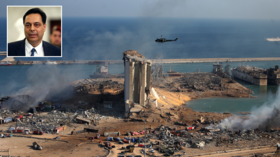Beirut blast inquiry judge told by parliament that issuing subpoena for caretaker PM is excessive use of power

The Lebanese parliament has stated that the judge investigating the blast at the Port of Beirut last year overstepped his power by issuing caretaker PM Hassan Diab a subpoena after he failed to turn up for the inquiry.
In a letter to the prosecutor on Friday, the secretary general of Lebanon’s parliament told Judge Tarek Bitar, who is leading the inquiry into the explosion at Beirut’s port in August 2020, that his order was an excessive use of his power.
The parliament’s statement on Bitar’s issuing of a subpoena comes after Diab failed to be present at an inquiry into the blast, which killed over 200 and wounded around 7,500 others.
Also on rt.com Tear gas & rubber bullets used against Lebanese protesters demanding justice for victims of Beirut blast (VIDEOS)The court postponed Diab’s court date until September 20 to give him time to respond to that subpoena. If the caretaker PM refused to attend that session to testify over charges of negligence, Bitar would have the right to issue a warrant for his arrest. Diab rejects any claims of wrongdoing.
The inquiry was launched to find out who is responsible for the fatal explosion that caused large-scale devastation in the Lebanese capital. Over a year later, no senior politicians have been held accountable.
Bitar issued requests in July to question Diab and other top officials who were charged for negligence regarding the blast by former inquiry judge Fadi Sawan. Sawan was dismissed by the Lebanese court in February after two former ministers – who the judge accused of negligence over the blast – complained that he was acting out of his jurisdiction.
Also on rt.com One year on from the devastating Beirut port blast, no-one’s been held accountable and Lebanon is sliding towards civil warDiab was elected prime minister in January 2020, but resigned just days after the Beirut explosion last year following public outcry and demands his government step down. However, subsequent attempts to form a new government have proved futile, meaning that he remains in a caretaker role.
The economic instability which gripped Lebanon even before the blast has worsened since the disaster, with the World Bank Lebanon Economic Monitor saying in June that the country’s financial crisis is one of the worst since the mid-nineteenth century.
Think your friends would be interested? Share this story!















